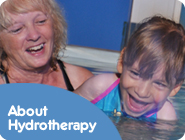Therapies
Therapies
Hydrotherapy
When children access Hydro Therapy they relax, laugh and smile and that's why our Hydro Therapy Provision is so important. It helps children to develop their balance, co-ordination, mobility, communication and it promotes independence as well as being a great source of ‘fun' too.
Children work really hard through enjoyment whilst using the pool. They have to practise their dressing and undressing skills, listen to verbal instructions such as ‘splash using your legs', ‘blow bubbles' and also have the opportunity to develop their learning, practice mobility and floating skills; achieving things they would never achieve out of the water because being in a warm, stimulating environment is fun and motivating.
Light Therapy:
The light therapy room is a colourful room used by all children across school. Trained teaching assistants work with small groups of children based on classroom planning. The equipment in the light room can be used to develop the following skills: cause and effect, visual, hearing and listening skills, social skills, and communication. The room is a resource that provides children to learn about all areas of the curriculum but using a different approach.
Rebound therapy
Rebound therapy is using a trampoline for therapeutic exercise and recreation for people with special needs. It's used to facilitate movement, promote balance, increase or decrease muscle tone, promote relaxation, sensory integration, improve fitness and exercise tolerance and to improve communication skills.
Specialist staff work with physiotherapists to assess a child's needs, then provide weekly sessions to meet stated goals. They record and measure the small steps along the way, selecting equipment activities and ensuring each session is fun and increases a child's confidence.
The trampoline is also used as part of each child's P.E. provision so all children will be offered opportunities to access it , irrespective of their need .
Sound Therapy:
Sound therapy uses specialist equipment for children to make music and sounds whilst making a visual pattern. Limited children access the sound therapy in terms of their needs. A trained member of staff takes one child into the sound therapy room at a time and works on an individual programme to develop the child's communication, cause and effect, relaxation or social skills. The child's session may include microphone work, use of the sound beam to make music and sounds whilst feeling the vibrations on vibroacoustic box. The children not only receive auditory feedback but are able to watch the visual effects they make on the wall from the projected image they make whilst making music/sounds.
Sensory Integration Therapy
Sensory integration is the process by which the brain takes in and interprets information. This information is then used to control and organise the body so that a person can interact with the environment effectively.
'Making sense of sensory'
As sensory integration is a high priority in Sunningdale we have designated a room specifically for the promotion of it , and a main base for our many resources . We are currently modifying this room further to best meet the needs of our pupils .


